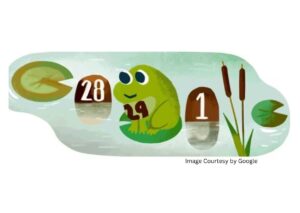Leap Day 2024: Celebrating the Additional Day with Engaging Facts and Traditions
Dive into the concept of Leap Day and its significance, established by Julius Caesar in 45 BCE. Explore interesting traditions, facts, and celebrations associated with this rare occurrence.
Welcome to the leap year phenomenon, where time itself takes a special leap forward! In this article, we’ll delve into the intriguing concept of Leap Day, which occurs every four years, including 2024. From its historical roots to unique traditions and celebrations, Leap Day holds a fascinating place in calendars worldwide. Today, February 29, 2024, we are celebrating Leap Day, which is a rare and special occasion that occurs only once every four years. During this day, an extra day is added to the year, making it 366 days long instead of the usual 365. This phenomenon usually occurs in most years that are evenly divisible by four, such as 2020, 2024, 2028, and so on.
Leap Day: A Brief Overview
Let’s start with the basics. Leap Day, occurring on February 29th, is an additional day added to the calendar during leap years. This adjustment ensures that our calendar stays synchronized with the Earth’s revolutions around the sun. Without this extra day, our calendar would gradually drift out of alignment with the solar year, leading to significant discrepancies over time.
Understanding the Concept : The Origin Story
Leap Day traces back to the Roman calendar reform led by Julius Caesar in 45 BCE. Caesar, seeking to align the calendar with the solar year, introduced the concept of adding an extra day to February every four years. This adjustment, while simple in theory, has profound implications for keeping our calendars accurate.
Fascinating Traditions & Superstition about Leap Day
1. Leap Year Babies
One of the most intriguing aspects of Leap Day is the phenomenon of “leaplings” or “leap year babies.” These individuals, born on February 29th, celebrate their birthdays only once every four years, adding a unique flair to their existence.
2. Role Reversal Tradition
In earlier times, Leap Day held special significance beyond its calendrical implications. It was a day when traditional gender roles were reversed, allowing women to propose to men. This tradition, while fading in modern times, reflects the playful spirit associated with this rare day.
3. Leap Year Capitals
Did you know that there are designated Leap Year capitals in the world? Anthony, Texas, and Anthony, New Mexico, proudly bear this title and host extravagant celebrations every Leap Day, showcasing the communal spirit surrounding this event.
4. The Chinese Calendar
While the Gregorian calendar isn’t the only one to account for leap years, the Chinese calendar has its unique approach. In certain years, an extra month is added to maintain alignment with lunar cycles, demonstrating the diverse methods cultures employ to manage time.
Embracing Leap Day 2024
As we approach Leap Day 2024, let’s embrace this rare occurrence with enthusiasm and curiosity. Whether you’re a leapling celebrating a milestone birthday or simply fascinated by the quirks of timekeeping, Leap Day offers a moment to pause and appreciate the intricacies of our calendar system.
 Google is commemorating ‘Leap Day’ today on 29 February with a special Google Doodle.
Google is commemorating ‘Leap Day’ today on 29 February with a special Google Doodle.
Google is celebrating ‘Leap Day’ today on Thursday, 29 February 2024 with a captivating Doodle. The Doodle for Leap Year 2024 features a charming depiction of a frog in a pond, taking a swift leap from the number 29, with numbers 1 and 28 flanking it on either side.
In a delightful announcement accompanying the Doodle, Google wishes everyone a Happy Leap Day and shares some interesting tidbits about this special occasion. Leap Day, occurring only once every four years on 29 February, serves the essential purpose of maintaining synchronization between our calendars and the Earth’s orbit around the sun.
In addition to showcasing the quirky Leap Day 2024 Doodle, Google also sheds light on the inception of Google Doodles. Over the decades, Google has created more than 5,000 Doodles, with the very first one appearing in 1998. It was a creative way for Google founders Larry Page and Sergey Brin to inform people that they would be away for Burning Man.
This isn’t the first time Google has celebrated Leap Day. In 2020, they marked the occasion with another delightful Doodle, emphasizing the rarity of this day and its significance in keeping our calendars accurate.
So, as Google hops into Leap Day with its charming Doodle, let’s join in the celebration and make the most of this bonus day in February. Happy Leap Day to all!
Frequently Asked Questions
What is the purpose of Leap Day? Leap Day, occurring every four years, serves to align the calendar with the Earth’s orbit around the sun, ensuring seasonal accuracy.
Why is February 29th chosen as Leap Day? February 29th is added to the calendar to compensate for the extra time it takes the Earth to complete its orbit, maintaining synchronization with the solar year.
How do leaplings celebrate their birthdays? Leaplings typically celebrate their birthdays on either February 28th or March 1st during non-leap years, while enjoying a special occasion every four years on February 29th.
Are there any cultural traditions associated with Leap Day? Historically, Leap Day was celebrated as a day of role reversal, allowing women to propose to men. While this tradition has waned, it remains a fascinating aspect of Leap Day lore.
What are Leap Year capitals, and why are they significant? Leap Year capitals, such as Anthony, Texas, and Anthony, New Mexico, are cities that host elaborate celebrations every Leap Day, highlighting the global enthusiasm for this rare occurrence.
How often does Leap Day occur? Leap Day occurs once every four years, adding an extra day to the calendar during leap years to maintain chronological accuracy.
Conclusion
As Leap Day 2024 approaches, let’s marvel at the intricate mechanisms that govern our calendars and the cultural significance attached to this extraordinary day. Whether you’re pondering the origins of Leap Day or joining in the festivities, embrace this additional day with wonder and appreciation for the passage of time.
